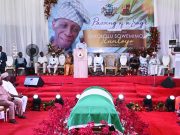By Niyi Olaoye
Indications have emerged that due to uncertainties in the economic environment, most Nigerian banks are not willing to lend to each other and to the real sector of the economy, preferring to place their excess liquidity with the Central Bank of Nigeria (CBN) for interest earning purposes.
Cowry Assets Management Limited revealed that Standing deposit facility (SDF) by the close of business last week increased by 23.64 per cent to N616.13 billion,” suggestive of surplus banks’ unwillingness to lend to one another,” while standing lending facility (SLF) increased by 97.90 per cent to N102.89 billion as borrowers (deficit units) borrowed from the CBN official window.
Banks access the SLF to borrow from the Central Bank of Nigeria (CBN) while they access the SDF to place deposit with the CBN. Presently the CBN charges 15 per cent as interest rate on loans to banks through the SLF while it pays 11 per cent as interest on deposit placement through the SDF.
The CBN had stopped publishing how much banks are making by lacing their excess liquidity as deposit via its Standing Deposit Facility.
However, prior to the stoppage, it will be recalled that in January 2015, that banks earned N27.26 billion as net interest earned from placing their excess liquidity as deposit with the CBN in one year.
Investigations revealed that from October 2013 to September 2014, banks placed N81.85 trillion as deposit with the CBN through the SDF and borrowed N5.14 trillion through the SLF. Further, the CBN paid interest of N32.9 billion on the deposit through the SDF, while it earned interest of N3.68 billion on loans to banks through the SLF.
Subsequent CBN’s Economic Report omitted information on how much banks made by placing their money as deposit via the SDF. Rather, the apex bank limited its report to how much it lent to banks via the SLF and how much banks placed as deposit via the SDF.
Meanwhile, Nigeria Interbank Offered Rate (NIBOR) for overnight funds last week, one month, three months and six months increased to 4.33 per cent (from 3.27 per cent), 9.04 per cent (from 9.02 per cent), 11.87 per cent (from 11.41 per cent) and 13.25 per cent (12.79 per cent).
Similarly, yields on the Nigerian Interbank True Treasury bills moved in mixed directions as yields on the one month and six months maturities fell to 3.33 per cent (from 4.43 per cent) and 9.08 per cent (from 9.13 per cent) respectively; while yields on the three months and 12 months maturities rose to 7.42 per cent (from 7.06 per cent) and 11.83 per cent (from 11.29 per cent) respectively.








































Comments are closed.